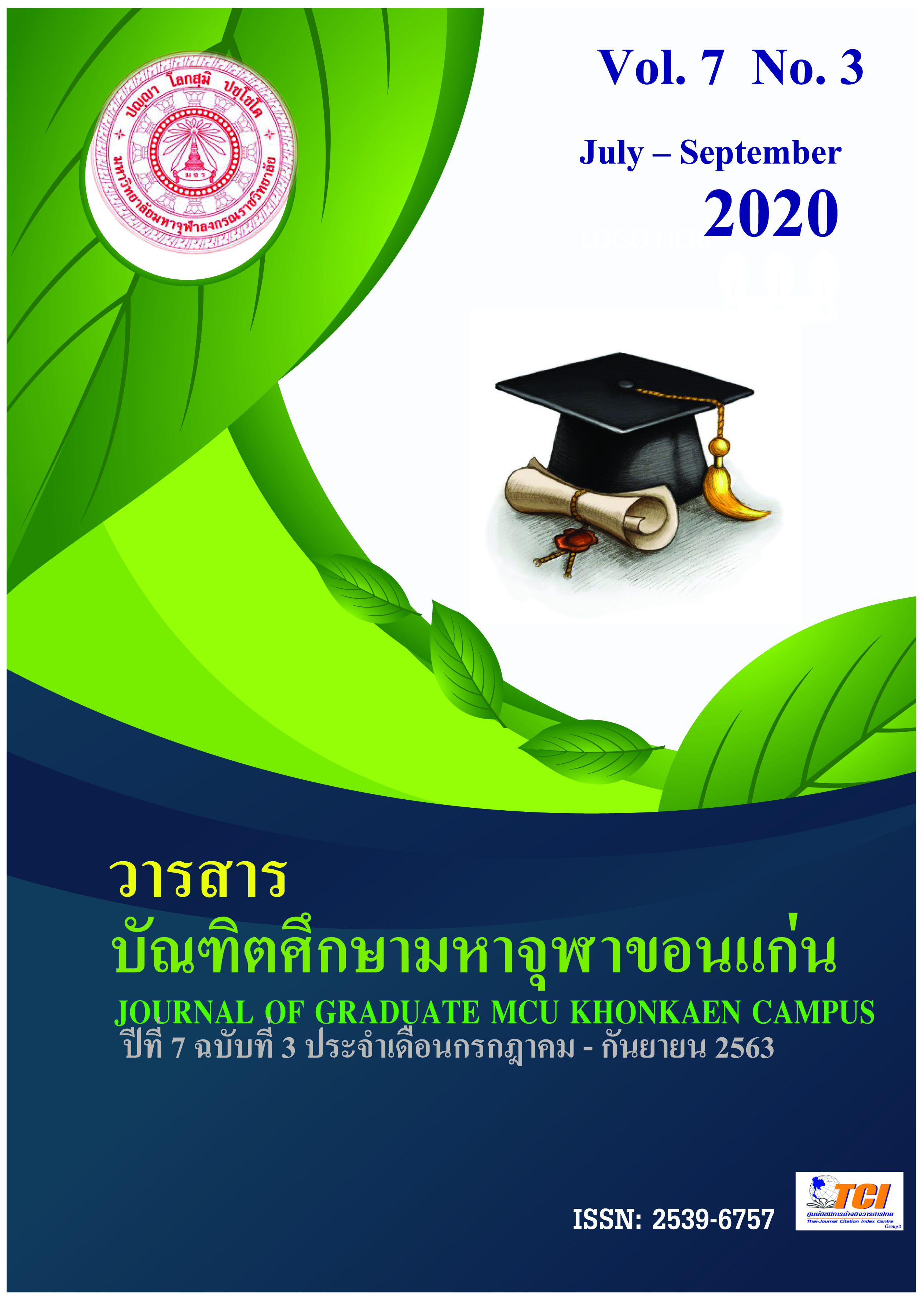รูปแบบการปลูกฝังคุณธรรมจริยธรรมสำหรับเยาวชนอำเภอจัตุรัส จังหวัดชัยภูมิ
Main Article Content
บทคัดย่อ
ดุษฎีนิพนธ์เรื่องนี้ มีวัตถุประสงค์ ๑) เพื่อศึกษาแนวคิด ทฤษฎี และหลักพุทธธรรมที่เกี่ยวกับการปลูกฝังคุณธรรมจริยธรรมสำหรับเยาวชน ๒) เพื่อศึกษาสภาพปัญหาเกี่ยวกับด้านคุณธรรมจริยธรรมของเยาวชนอำเภอจัตุรัส จังหวัดชัยภูมิในปัจจุบัน ๓) เพื่อเสนอรูปแบบการปลูกฝังคุณธรรมจริยธรรมสำหรับเยาวชนอำเภอจัตุรัส จังหวัดชัยภูมิ การวิจัยครั้งนี้เป็นการวิจัยเชิงคุณภาพวิเคราะห์เอกสาร (Documentary Research) และการวิจัยภาคสนามจากการสัมภาษณ์กลุ่มเป้าหมาย นำเสนอข้อมูลด้วยวิธีพรรณาวิเคราะห์
ผลจากการศึกษาพบว่า
การปลูกฝังและเสริมสร้างคุณธรรมจริยธรรม โดยจะเริ่มต้นจากพัฒนาการของการเชื่อฟังและการถูกลงโทษไปจนกระทั่งถึงรู้จักรับผิดชอบชั่วดี รู้สึกละอายที่ทำชั่ว มีสติต่อการกระทำจนเกิดเป็นอุปนิสัยต่อการรับผิดชอบต่อสังคม หลักอริยวัฑฒิ ๕ อันประกอบด้วย คือ ศรัทธา คือความเชื่อด้วยปัญญาและเหตุผล ศีล คือการรักษาศีลของชาวพุทธทั่วไป สุตะ คือการศึกษาและแสวงหาความรู้ จาคะคือการรู้จักเสียสละแบ่งปันแก่ผู้อื่น และปัญญา คือมีความรู้จริง เข้าใจเหตุผลและรู้เท่าทันโลก คุณธรรมจริยธรรมที่จะช่วยค้ำจุนรากเหง้าทางวัฒนธรรมที่ดีงามและเป็นเสมือนหน่อแก้วของพระพุทธศาสนา และเป็นต้นแบบที่ดีให้แก่บุคคลอื่นในสังคมได้ปฏิบัติตามเพื่อเป็นฐานรากที่ดีของประเทศชาติในอนาคตข้างหน้าสืบไป
ปัญหาที่เยาวชนมีพฤติกรรมความรุนแรงมากขึ้น โดยพบเห็นได้ทั่วไปทั้งในเยาวชนชายและหญิงมีแนวโน้มของการความรุนแรงเพิ่มขึ้น การขาดจิตสาธารณะหรือความรับผิดชอบต่อสังคม ขาดความเสียสละไม่เคารพในสิทธิเสรีภาพของผู้อื่น ให้ความสำคัญกับกิจกรรมของชุมชนน้อย จากการมีอิทธิพลของกลุ่มเพื่อน ความสัมพันธ์ในครอบครัวที่ไม่อบอุ่น การใช้อินเตอร์เน็ตและโลกโซเชียลที่ไม่สามารถควบคุมได้ ความคึกคะนองและไม่เคารพกฎหมาย การซึมซับจากพฤติกรรมที่ไม่ดีของผู้คนในสังคม และปัญหาการขาดศีลธรรมและความเคารพศรัทธาในพระพุทธศาสนา ละเลยการนำหลักธรรมคำสอนมาใช้ในการดำเนินชีวิต
แนวทางการปลูกฝังคุณธรรมจริยธรรมตามหลักอริยวัฒิ ๕ ศรัทธา ศีล สุตะ จาคะ ปัญญาการจัดกิจกรรมในหลายรูปแบบ คือ กิจกรรมกลุ่ม คือการเข้าค่ายอบรมคุณธรรมจริยธรรม กิจกรรมกลุ่มย่อย กำหนดให้เยาวชนสาสาสมัครเข้าร่วมข้ากิจกรรมในวันสำคัญทางพระพุทธศาสนาแบ่งเป็นกลุ่มย่อย ๆ ตามพื้นที่ชุมชนที่อยู่อาศัย กิจกรรมในโรงเรียน ที่ต้องอาศัยกิจกรรมร่วมกับการเรียนการสอน และกิจกรรมในครอบครัวที่ผู้เข้าร่วมกิจกรรมต้องทำกิจกรรมด้วยตนเองในชีวิตประจำวัน กิจกรรมต่าง ๆ นั้นทำให้ผู้เข้าร่วมกิจกรรมมีพฤติกรรมเชิงบวกเพิ่มขึ้น มีความละอายต่อการประพฤติผิด มีความเสื่อมใสศรัทธาต่อพระพุทธศาสนา มีจิตใจที่สงบสุข มีความเสียสละและเอื้อเฟื้อต่อผู้อื่นและสังคม
คำสำคัญ: รูปแบบการปลูกฝังคุณธรรมจริยธรรมสำหรับเยาวชน

